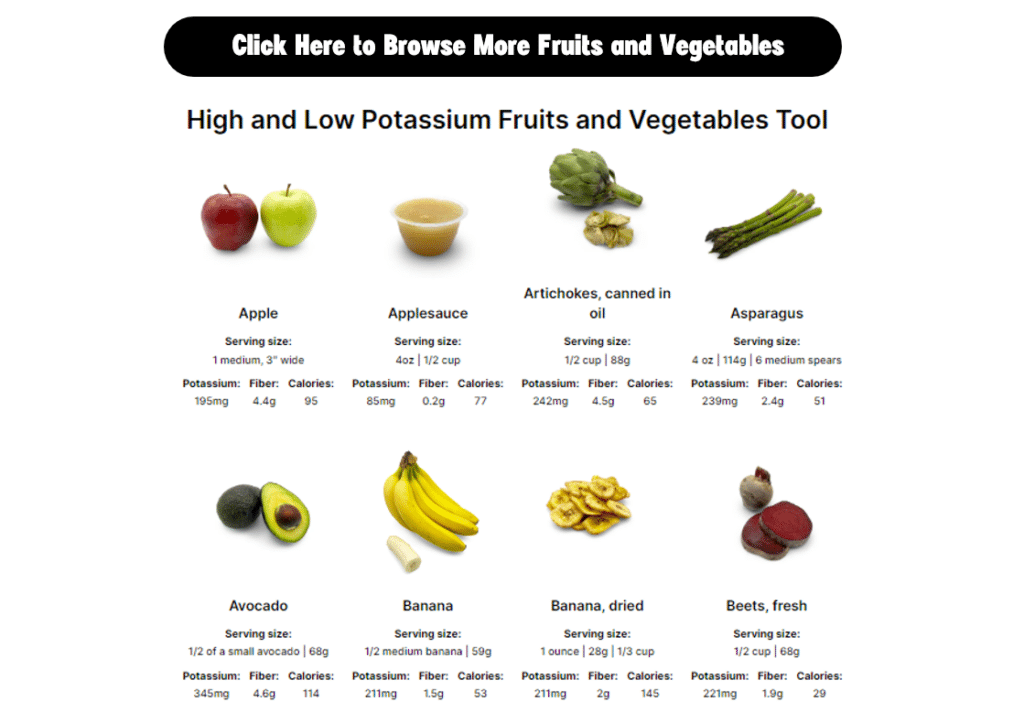Is avocado good for kidneys?
Yes, avocados are high in healthy monounsaturated fats as well as an excellent source of fiber. Avocados also contain many vitamins and antioxidants that are beneficial to people with kidney disease.
This post may contain affiliate links through which we may earn a small commission to help keep this website free.
Is avocado high in potassium?
Yes, avocados are considered a high potassium food. One half of a small avocado contains 345mg of potassium.
Most kidney professionals consider a vegetable to be high potassium if it contains more than 200mg of potassium per serving.
If you have kidney disease, you should not restrict your intake of fruits and vegetables because of potassium content unless instructed by your kidney dietitian or healthcare provider. Many people who have kidney disease do not need to restrict their intake of potassium. There are many other factors that could cause you to have high potassium levels that are not related to the food you eat. You can learn more about potassium and kidney disease through our low cost course.
Is avocado high in phosphorus?
No. One half cup of avocado contains about 39mg of phosphorus. The phosphorus found in avocado is natural and poorly absorbed by the body, so it is considered a low phosphorus food.
For more information about phosphorus and kidney disease, check out our youtube video.

What are the benefits of avocado?
- Avocado is high in vitamins, antioxidants, and fiber. Antioxidants consumed through fruits and vegetables are considered to have protective effects against many chronic diseases.
- Avocados are rich in dietary fiber, which aids digestion and promotes regular bowel movements. The fiber content helps prevent constipation and supports a healthy digestive system. Avoiding constipation is an important way of helping maintain good potassium levels.
- Avocados are a good source of plant-based fats. People with kidney disease need to ensure that they get plenty of healthy fats into their diet.
- Research shows that a low intake of fruits and vegetables is associated with an increased risk of developing kidney failure in people with kidney disease (as well as those who don’t have kidney disease), so be sure to eat adequate fruits and vegetables each day.
Is avocado high in oxalates?
According to our sources, avocados are low oxalate foods, however there is some literature that suggests they may be moderate oxalate foods. Our source found that they contained 0.4-2.1mg of oxalate per 100g portion, although an older source found them to contain 8.6mg per 100g of oxalate. If you are prone to developing kidney stones, avoiding oxalates is not necessarily the best approach to preventing future stones. I recommend signing up for my free kidney stone newsletter where I talk a lot about kidney stones, how to read your labwork, and what nutrition strategies to implement to prevent future stones.
Oxalates are naturally occurring compounds found in many foods. When consumed, oxalates can bind with calcium in the body to form crystals, which can contribute to the formation of kidney stones in some individuals.
Kidney stones are hard deposits that form in the kidneys when there are high levels of certain substances, such as calcium, oxalate, and uric acid, in the urine. The most common type of kidney stone is calcium oxalate stones, which are formed when calcium and oxalate combine in the urine.
While oxalates are present in many foods, not everyone who consumes oxalates will develop kidney stones. Factors such as individual susceptibility, overall diet, and lifestyle choices play a role in kidney stone formation.
The highest oxalate fruits and vegetables are spinach, rhubarb, and swiss chard. However, it’s important to note that the mere presence of oxalates in food does not guarantee kidney stone formation. If you are not prone to developing kidney stones, then there is no reason to avoid foods that are high in oxalate.
Healthy ways to eat avocado?
- Slice or dice fresh avocado and add it to salads like our Quinoa Salad with Cashew Lime Butter
- Mash it into guacamole – just be careful how much salt you add to your guacamole. Using other seasonings like onion, garlic, cayenne pepper, coriander, and cumin can help enhance the flavor of your guacamole without requiring excess salt.
- Mash it and put it on bread to make avocado toast. Experiment with different toppings to change up the flavor profile.
- Dice it up and add it to salsas like our Kidney Friendly Corn and Black Bean Salsa for added creaminess.
- Add it to any Tex-Mex style dish for a pop of color and flavor like our Cotija Avocado Rice Pilaf
High and Low Potassium Fruit and Vegetable Tool
Looking for more information on other kidney friendly fruits and vegetables? Check out our Fruit and Vegetable Potassium Tool.

